
Newgate Prison, MacHeath, and Freedom
The 18th Century Prison:

A carvinal-like atmosphere prevails at executions,
which were a popular public spectacle in the 18th century.
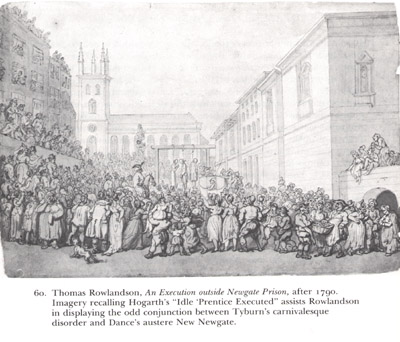
The prison also provoked riots and resistance:
here is an image representing the burning of Newgate
during the Gordon riots on June 7th, 1780.
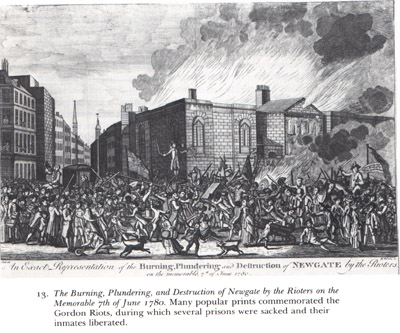
After 1780, Newgate is rebuilt:
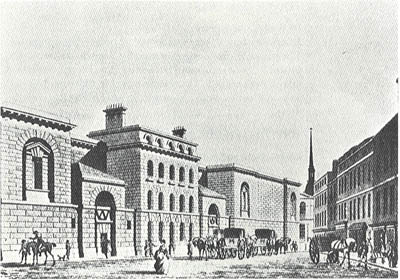
As time passes, executions are moved further from the crowd,
and made more efficient:
here 9 men and women are executed at the same time.

The Beggar's Opera: it develops a systematic enlightenment critique
of the corruption and unfairness of the legal system. It puts the action
within the prison:
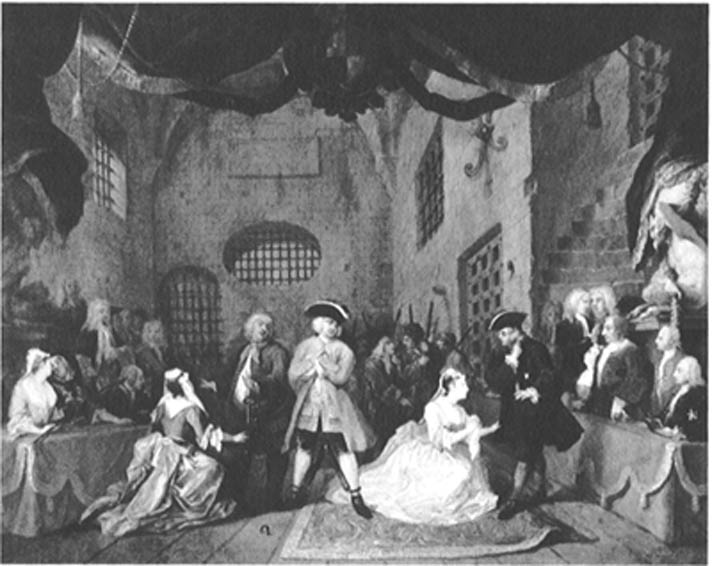
MacHeath sings these words while awaiting his execution:
"Since laws were made for every degree,
To curb vice in others, as well as me,
I wonder we han't better company
Upon Tyburn Tree;
But gold from law can take out the sting;
And if rich men like us ere to swing,
'Twould thin the land, such numbers to string
Upon Tyburn Tree!" --MacHeath, Act III, Air 67, p. 118
Why can the criminal become attractive hero within modern entertainment?
why (as with the Western) so often the focus of entertainment?
| MacHeath and women: why is MacHeath so disloyal to Polly, Lucy and others? |
| MacHeath: "What a fool is a fond wench! Polly is most confoundedly bit. I love the sex. And a man who lives money, might as well be contented with one guinea, as I with one woman." Act II:3, p.72. |
| MacHeath's woman problem: What does the "cat fight" in the prison effect our view of the women? What is Polly trying to do? What is MacHeath trying to do? |
|
II:8: p.91-95 POLLY. Air XXXVII. Decency, Madam, methinks might teach you to behave yourself with some
Reserve with the Husband, while his Wife is present. LUCY.Air XXXVIII. [To him.] The scoff of such a Gipsy? Saucy Jade! POLLY. Air XXXIX. Scene 15. LUCY, MACHEATH. MACHEATH. I am not naturally Compassionate, Wife; so I could not use the Wench as she deserv'd; which made you at first suspect there was something in what she said. LUCY. Indeed, my Dear, I was strangely puzzled. |
| How does MacHeath's disloyalty make Polly noble love look? Do you think he is justified in spurning Polly at this moment? of manipulating Lucy? |
MacHeath and the idea of freedom:
| MacHeath and the idea of freedom: the two economies of human exchange in The Beggar's Opera | ||
| Restricted economy | Extravagant* economy (*extra-vagant = outside of the path) | |
| Exchange | Free gift | |
| for Interest | Love and Honor | |
| Put the self first | Put an other (person or ideal) first | |
| Think of the future | Enjoy life in the present | |
| Realistic (the way of the world) | Idealistic (the way the world should be) | |
| Act 1 | ||
| Peachum and Mrs. Peachum advise Polly to secure her interest | Polly refuses to "murder the man I love" | |
| Peachum and Mrs. Peachum agree to have MacHeath executed | Polly warns MacHeath, | MacHeath flees... |
| Act 2 | ||
| Jenny Diver and Suky Tawdry betray MacHeath to Peachum | MacHeath's celebration with the female gang Lucys accuses MacHeath of infidelity |
|
| Peachum and Lockit to go halves, but almost fall out Lockit tries to teach Lucy to look to her own interest |
Love triangle: Polly and Lucy fight over MacHeath MacHeath wins Lucy's aid; |
MacHeath escapes from prison... |
| Act 3 | ||
| Trapes and Cooker betray MacHeath to Peachum | Lucy tries to poison Polly (murderous excess of passion) | |
| MacHeath condemned to immediate execution |
After farewell to the women and life, |
MacHeath does not escape through death; instead, he receives an improbably reprieve and is freed... |
Forces closing in on MacHeath: Hogarth's painting of the climactic moment of Act III
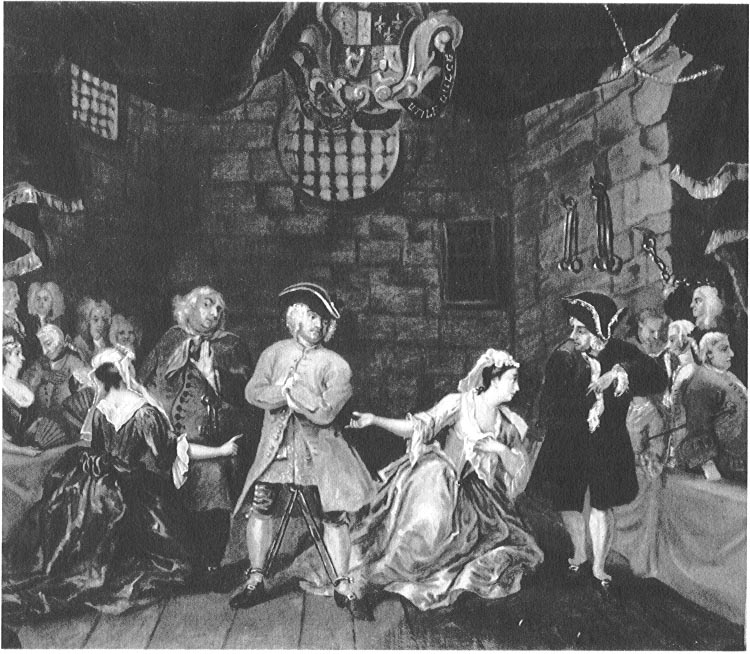
What is the social problem posed by the man who would be radically "free" of social constraint?
| The sober finale: political critique |
|
III:13, p. 118-122 MacHeath: Air LXVII.--Green Sleeves. |
| Facing death, what regrets does he have about the gang? how does MacHeath seek to extract justice for himself? |
| Scene 14. MACHEATH, BEN BUDGE, MATT OF THE MINT. MACHEATH. For my having broke Prison, you see, Gentlemen, I am order'd immediate Execution.----The Sheriff's Officers, I believe, are now at the Door.----That Jemmy Twitcher should peach me, I own surpris'd me!----'Tis a plain Proof that the World is all alike, and that even our Gang can no more trust one another than other People. Therefore, I beg you, Gentlemen, look well to yourselves, for in all probability you may live some Months longer. MATT. We are heartily sorry, Captain, for your Misfortune.--- -But 'tis what we must all come to. MACHHEATH. Peachum and Lockit, you know, are infamous Scoundrels. Their Lives are as much in your Power, as yours are in theirs.---- Remember your dying Friend!----'Tis my last Request.-- --Bring those Villains to the Gallows before you, and I am satisfied. MATT. We'll do it. JAILOR. Miss Polly and Miss Lucy intreat a Word with you. MACHEATH. Gentlemen, adieu. |
| How does MacHeath respond to the efforts of the women to attach themselves to him? how do the women effect his courage? |
|
Scene 15. LUCY, MACHEATH, POLLY. MACHEATH. My dear Lucy----My dear Polly.
Whatsoever hath pass'd between us is now at an end----if
you are fond of marrying again, the best Advice I can give you is to Ship
yourselves to the West-Indies, where you'll have a fair Chance of getting
a Husband a-piece, or by good Luck, two or three, as you like best. POLLY.
How can I support this Sight! Air LXVII.--All you that must take a Leap, &c. JAILOR. Four Women more, Captain, with a Child apiece! See, here they come. [Enter Women and Children.] MACHEATH. What----four Wives more!----This is too much----Here----tell the Sheriff's Officers I am ready. [Exit Macheath guarded.] |
| The happy ending: given the forces arrayed against MacHeath's freedom,
how does the Beggar claim the opera should end? what justification does the Player offer for MacHeath's "reprieve"? |
| Scene 16. To them, Enter PLAYER and BEGGAR. PLAYER. But, honest Friend, I hope you don't intend that Macheath shall be really executed. BEGGAR. Most certainly, Sir.----To make the Piece perfect, I was for doing strict poetical Justice----Macheath is to be hang'd; and for the other Personages of the Drama, the Audience must have suppos'd they were all hang'd or transported. PLAYER. Why then Friend, this is a downright deep Tragedy. The Catastrophe is manifestly wrong, for an Opera must end happily. BEGGAR. Your Objection, Sir, is very just, and is easily remov'd. For you must allow, that in this kind of Drama, 'tis no matter how absurdly things are brought about----So----you Rabble there----run and cry, A Reprieve! ----let the Prisoner be brought back to his Wives in Triumph. PLAYER. All this we must do, to comply with the Taste of the Town..... Had the Play remain'd, as I at first intended, it would have carried a most excellent Moral. 'Twould have shown that the lower sort of People have their Vices in a degree as well as the Rich: And that they are punish'd for them. |
| How does MacHeath respond to his reprieve? |
| MACHEATH. So, it seems, I am not left to my Choice, but must have a Wife at last.----Look ye, my Dears, we will have no Controversy now. Let us give this Day to Mirth, and I an sure she who thinks herself my Wife will testify her Joy by a Dance. ALL. Come, a Dance----a Dance. MACHEATH. Ladies, I hope you will give me leave to present a Partner to each of you. And (if I may without Offence) for this time, I take Polly for mine.----And for Life, you Slut,----for we were really marry'd.----As for the rest.--- -But at present keep your own Secret. |
| Are you satisfied with the ending? How does it reflect upon the audience's desire? How does the video version of the Opera change the ending? |
| The final effect of Gay's The Beggar's Opera: | |
| pervasive irony produced by the disparity between opposites | |
| songs of love | political critique of the system |
| Polly's noble love | MacHeath's womanizing |
| Happy ending (what the audience is granted) | what we know the world to be (interest, cynicism, self-serving) |